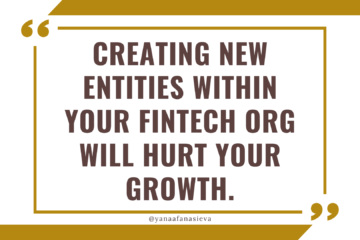The Type of Compliance Officers that FinTech Startups Need Today
Let’s look at one FinTech’s onboarding flow metrics:
- Started the registration process – 100%
- A confirmed email with a reverse link – 90%
- Started providing KYC information (e.g. name, address, etc) – 88%
- Started video verification – 55% (many of the users apparently did not have the document at hands or came from the wrong countries and were not eligible for the service)
- Uploaded proof of address – 44%
- Successfully completed verification – 35%
- Initiated their first transaction within 30 days after the registration – 10% (out of which about 30% of the transactions failed due to card declines, non-sufficient funds, timeout issues, and other glitches)
- Initiated more than 3 transactions within 30 days after registration – less than 3 %
And you are honestly telling me this is a compliance problem?
Business and product people would argue that “yes, indeed – this is a compliance problem”. However, most compliance people would argue that this is a technical or marketing problem because they are not responsible for user experience, they just provided the requirements of what needs to be collected.
You know what almost all compliance officers REALLY want? They want to work on cool projects, they want to work with cool tools, they love learning new things and they want to be appreciated for what they do.
It’s that simple.
But…
What do they believe? What shapes their reality?
They often believe that most of the following statements are true:
- Solving regulatory problems take a long time.
- Technology is confusing.
- I need a lot of money and a lot of people to do what I need to do.
- It’s too complicated.
- There are too many regulations and they are too complex.
- It’s hard to find good people to help me.
- My management (in fact – nobody) understands how hard it is.
- I don’t have enough time.
- I need to know exactly what is required by all the regulations otherwise I cannot act.
- Auditors are here to kill and destroy my reputation.
- Risks are everywhere and I will likely go to prison if I miss something.
- It’s a miracle we are still in business.
No wonder compliance feels costly and confusing and takes forever if that’s your attitude.
How to solve it?
Well – remember the look inside of the compliance officer’s brain?
Modern times need a special kind of a compliance officer who thinks differently and who (potentially) has different incentives, such as:
- Compliance is simple and helpful, actually – it’s a lot of fun.
- I want to solve business problems and I care about what happens to customers.
- I don’t need to know everything, I need to know very few things to make the next step and then we will evaluate again.
- Making mistakes is no big deal because most actions are reversible, and most “mistakes” are not really mistakes.
- I can do more with fewer resources taking one step at a time.
- Auditors and regulators are great, they offer feedback and they are not scary, because they know less than I know about my business anyway.
So, how do you elevate the compliance function and make progress? Here are the typical stages FinTech startups go through:
Age of innocence: Ignore any compliance issues until you hit a roadblock.
Throw money at the problem once: Hire expensive lawyers to draft your T&Cs, Privacy Policy or legal opinion without understanding what they wrote (but hoping it’s ok).
Stone age: DYI compliance, usually done by the CEO/CFO/founder in their spare time combined with email-based rudimentary customer-facing processes.
Firefighting: lots of overwhelmed people randomly using lots of tools with lots of bugs; the company has plenty of backlog issues and long to-do list, but without clear strategy how to fix it or what’s working and what’s not.
Leverage: when you can grow your business, launch new products, enter new markets without adding people or significant resources, using an existing team, technology, and minimal external help (if any).
I know, easier said than done 
If you feel you or your company are open to embracing the different approaches to compliance – consider utilizing the Compliance That Makes Sense Helpline!


